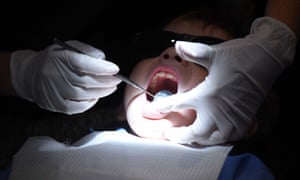We can’t talk about universal and equal healthcare without including dental health
The
history of public health over the past 40 years has been to consider a
need for universal healthcare for most parts of our body, but as soon as
the issue concerns our teeth rather than a bone or internal organ we
should pay the costs ourselves. A new report by the Grattan Institute
demonstrates this has led to a massive inequality of dental care and
shows it is time to move towards a universal dental scheme.
The Grattan Institute’s “Filling the Gap” report notes that when Medicare was introduced, it did not include coverage for a range of other services. However, since then it has been extended to “a number of additional health services, including nursing, psychology, physiotherapy, chiropractic, dietetics, podiatry, occupational therapy, osteopaths, audiologists, exercise physiologists and speech pathologists”. And yet primary dental care remains on the outer.
The report highlights how severe this impact is for dental care.The Grattan Institute’s “Filling the Gap” report notes that when Medicare was introduced, it did not include coverage for a range of other services. However, since then it has been extended to “a number of additional health services, including nursing, psychology, physiotherapy, chiropractic, dietetics, podiatry, occupational therapy, osteopaths, audiologists, exercise physiologists and speech pathologists”. And yet primary dental care remains on the outer.
They estimate that in the past 12 months just over 2 million (18%) of Australians who needed to see the dentists delayed or skipped seeing a dentist due to cost. There is a straightforward link between household income and the likelihood of skipping going to the dentist – much more so than for skipping a GP visit or seeing a specialist:
But there are a couple of problems. The first and biggest is the cost – some $5.6bn a year.
Rather than do one big hit, the report recommends the commonwealth government should first “take over funding of existing public dental schemes, fund them properly to the tune of an extra $1.1 billion per year”.
They then argue to extend the care to those on all Centrelink payments, for all children with a view to becoming universal within a decade.
But the second issue is the number of dentists and dental health practitioners. They note that “Australia has fewer dentists per 100,000 people than many other OECD countries” and thus we need to “further increase dentist training numbers, and maintain pathways for internationally-trained dentists to practice here”.
The report does note that dentist do appear to work part-time in greater numbers than other healthcare workers and that this suggests that any increase in demand due to increased public dental funding “be absorbed, at least in part” by the current numbers.
For more than 40 years dental care has been placed in the too hard (and too expensive) basket for Medicare. The Grattan Institute’s report note that this has led to a large inequality of dental care and an overall growing in dental care problems.
And while the cost is large, it is clear that to talk of a universal and equal healthcare without including dental health means overlooking a major aspect of our quality of life, and condemns those on lower incomes to worse health.
• Greg Jericho is a Guardian Australia columnist

No comments:
Post a Comment